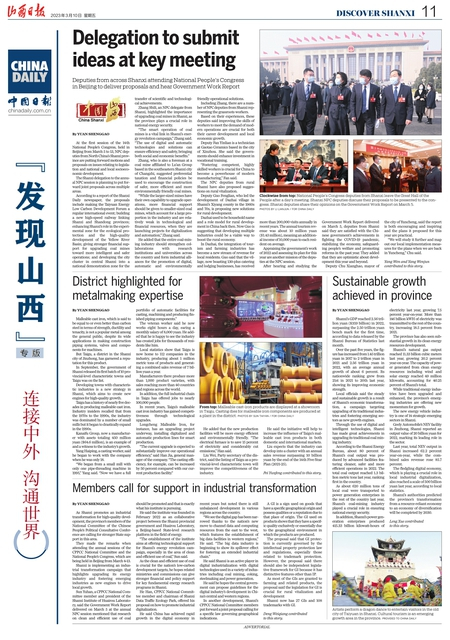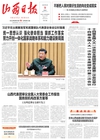Delegation to submit ideas at key meeting
Deputies from across Shanxi attending National People’s Congress in Beijing to deliver proposals and hear Government Work Report
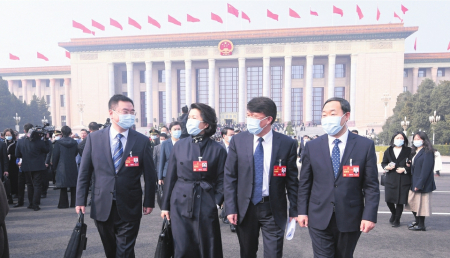
National People’s Congress deputies from Shanxi leave the Great Hall of the People after a day’s meeting.Photos by Li Lianjun/for China DailyChina Daily
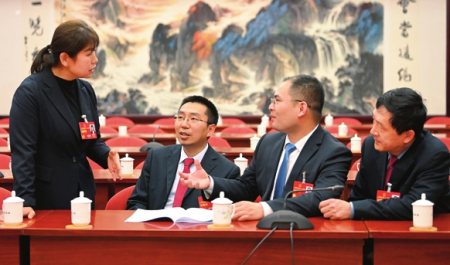
Shanxi NPC deputies discuss their proposals to be presented to the congress.Photos by Li Lianjun/for China DailyChina Daily
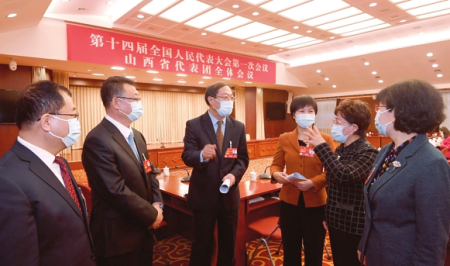
Shanxi deputies share their opinions on the Government Work Report on March 5. Photos by Li Lianjun/for China DailyChina Daily
At the first session of the 14th National People's Congress, held in Beijing from March 5 to 13, NPC deputies from North China's Shanxi province are putting forward motions and proposals on issues relating to legislation and national and local socioeconomic development.
The Shanxi delegation to the annual NPC session is planning to put forward joint proposals across multiple areas.
According to a report of the Shanxi Daily newspaper, the proposals include making the Taiyuan Energy Low Carbon Development Forum a regular international event; building a new high-speed railway linking Shanxi and Shandong provinces; enhancing Shanxi's role in the experimental zone for the ecological protection and the high-quality development of the Yellow River Basin; giving stronger financial support for upgrading coal mines toward more intelligent and safer operations; and developing the city cluster in central Shanxi into a national demonstration zone for the commercialization of scientific and technological achievements.
Zhang Shili, an NPC delegate from Shanxi, highlighted the importance of upgrading coal mines in Shanxi, as the province plays a crucial role in national energy security.
"The smart operation of coal mines is a vital link in Shanxi's energy revolution campaign," Zhang said. "The use of digital and automatic technologies and solutions can ensure efficiency and safety, bringing both social and economic benefits."
Zhang, who is also a foreman at a coal mine affiliated to Lu'an Group based in the southeastern Shanxi city of Changzhi, suggested preferential taxation and financial policies be used to encourage the construction of safer, more efficient and more environmentally friendly coal mines.
"While the larger-sized mines have their own capability to upgrade operations, more financial support should be given to smaller-sized coal mines, which account for a large proportion in the industry and are relatively weak in technological and financial resources, when they are launching projects for digitalization and automation," Zhang said.
He added that the entire coal-mining industry should strengthen collaborations with research institutions and universities across the country and form industrial alliances for the promotion of digital, automatic and environmentally friendly operational solutions.
Including Zhang, there are a number of NPC deputies from Shanxi representing grassroots workers.
Based on their experiences, these deputies said improving the skills of workers to meet the demand of modern operations is crucial for both their career development and local economic growth.
Deputy Fan Yinlian is a technician at Gaotao Ceramics based in the city of Xinzhou. She said the governments should enhance investment in vocational training.
"Fostering competent, highly skilled workers is crucial for China to become a powerhouse of modern manufacturing," Fan said.
The NPC deputies from rural Shanxi have also proposed suggestions on rural vitalization.
Deputy Guo Fenglian, who led the development of Dazhai village in Shanxi's Xiyang county in the 1960s and 1970s, is proposing new solutions for rural development.
Dazhai used to be household name and a role model for rural development in China back then. Now Guo is suggesting that developing multiple industries could be a viable way to boost the rural economy.
In Dazhai, the integration of tourism and farming industries has become a new revenue stream for local residents. Guo said that the village, now boasting 130-plus catering and lodging businesses, has received more than 200,000 visits annually in recent years. The annual tourism revenue was about 10 million yuan ($1.43 million), meaning an additional income of 10,000 yuan to each resident on average.
Appraising the government's work of 2022 and assessing its plan for this year are another mission of the deputies at the NPC session.
After hearing and studying the Government Work Report delivered on March 5, deputies from Shanxi said they are satisfied with the Chinese government's achievements in fighting the COVID-19 pandemic, stabilizing the economy, safeguarding people's welfare and promoting reforms in the past year. They added that they are optimistic about development for this year and beyond.
Deputy Chu Xianghao, mayor of the city of Yuncheng, said the report is both encouraging and inspiring and the plans it proposed for this year are practical.
"We will study it further and map out our local implementation measures for the plans when we are back in Yuncheng," Chu said.
Yang Wen and Yang Wenjun contributed to this story.
By Yuan Shenggao

